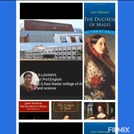
Summary of Duchess of Malfi
- Subject:
- Literature
- Material Type:
- Lecture
- Lecture Notes
- Student Guide
- Teaching/Learning Strategy
- Author:
- N. S. Lavanya Sasi
- Date Added:
- 08/06/2020

Summary of Duchess of Malfi
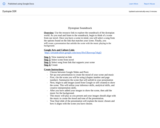
This document is a creative assignment that aligns with any dystopian novel and or short story. Students will view the sounds of dystopia and create a scene from the novel to accompany the sound.

Alice & Alias Abenteuer im Flachland elektronischer Lesegeräte
Word Count: 5476
(Note: This resource's metadata has been created automatically as part of a bulk import process by reformatting and/or combining the information that the author initially provided. As a result, there may be errors in formatting.)
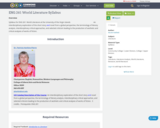
Syllabus for ENG 261: World Literature at the University of the Virgin Islands An interdisciplinary exploration of the short story and novel from a global perspective, the terminology of literary analysis, interdisciplinary critical approaches, and selected criticism leading to the production of aesthetic and critical analyses of works of fiction.

This resource is intended as a model plan for linking course materials to student learning outcomes. These materials were used in planning a 15-week literature-based composition course taught within the TBR system, ENGL1020. The two attachments illustrate how the course assessments and readings are organized to fulfill statewide TBR General Education Outcomes as well as course-specific outcomes for each unit in the course. The course outline also demonstrates one possibility for sequencing course materials into a 15 week semester.The OER Commons file titled "ENGL1020 Literature Based Composition Course Common Cartridge" contains a downloadable online version of this course that can be plugged into any LMS.

The materials in this resource are intended for first-week-of-class activities in a literature-based composition course, although "The Danger of a Single Story" would be appropriate for viewing and discussion at any time during the semester. The first section of this resource explains some reasons for taking a literature-based composition course. The remaining materials provide ice-breaker and introductory activites.The "Varieties of Why," the study questions, and the discussion board activity are licensed under CC BY-NC-SA. The "Danger of a Single Story" by Chimamanda Ngozi Adichie is used under CC BY-NC-ND 4.0.

This resource contains a downloadable common cartridge file for ENGL1020. The entire course is a true OER remix, containing original OER materials as well as OERs adopted or adapted from other authors. The course includes the texts of readings, or links to the text. Each page in the course has a CC license on it.
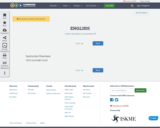
TASTY ALPHABET SOUP

This resource is for English 16 U.S. Literature. This course "engages questions of place, gender, and race, and examines American experiences and American cultural production."Materials include a syllabus, open pedagogy assignment Literary Artifact which was co-created with students, and student examples.
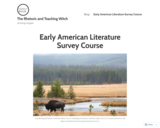
This course is a survey of Early American Literature (beginnings to 1890). The course includes suggested assignments, a course outline, and a MS Word text of Public Domain readings. This course is designed for a 16 week semester.
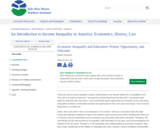
Not everyone can be great, but greatness can come from anywhere.
It's a wonderful sentiment, but becoming less and less true. We know the rich get richer and poor poorer, or at least perceive it through media, as well as in a middle class with a lot of internet access but not a lot of direction upward. In this unit we will try and prove that greatness can still come from anywhere. Where does inequality come from? What should we focus on most in order to right the ship in our lifetimes, so that our children benefit? It is important for young people to understand income inequality as a discipline, as a subject to study, as important and relevant to and in their math and English and Social Studies classes. Citing work from prominent economists like Anthony Atkinson and Raj Chetty, this unit simultaneously provides a foundational study of income inequality while arguing for increased equality of outcome for American students through their college graduation.
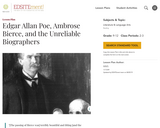
We are naturally curious about the lives (and deaths) of authors, especially those, such as Edgar Allan Poe and Ambrose Bierce, who have left us with so many intriguing mysteries. But does biographical knowledge add to our understanding of their works? And if so, how do we distinguish between the accurate detail and the rumor; between truth and exaggeration? In this lesson, students become literary sleuths, attempting to separate biographical reality from myth. They also become careful critics, taking a stand on whether extra-literary materials such as biographies and letters should influence the way readers understand a writer's texts.
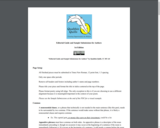
Quabbin Quills, a 501(c)(3) nonprofit in Massachusetts, designed an editorial guide for authors to get a general framework on how to format their work for submission as well as to display basic grammar rules for reference.

When John Locke declared (in the 1690 Essay Concerning Human Understanding) that knowledge was derived solely from experience, he raised the possibility that human understanding and identity were not the products of God’s will or of immutable laws of nature so much as of one’s personal history and background. If on the one hand Locke’s theory led some to pronounce that individuals could determine the course of their own lives, however, the idea that we are the products of our experience just as readily supported the conviction that we are nothing more than machines acting out lives whose destinies we do not control. This course will track the formulation of that problem, and a variety of responses to it, in the literature of the “long eighteenth century.” Readings will range widely across genre, from lyric poetry and the novel to diary entries, philosophical prose, and political essays, including texts by Alexander Pope, Jonathan Swift, Mary Astell, David Hume, Laurence Sterne, Olaudah Equiano, Mary Hays, and Mary Shelley. Topics to be discussed include the construction of gender identities; the individual in society; imagination and the poet’s work. There will be two essays, one 5-6 pages and one 8-10 pages in length, and required presentations.
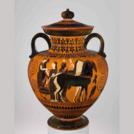
“Ekphrasis: An Exploration of Poetry Inspired by Art” is a multidisciplinary Open Educational Resource that showcases ekphrastic poems in the public domain alongside the artworks that inspired them. Collections of resources about each poem and the associated artwork both complement and supplement the poems. Resources include biographical information about the poet, and the artist where applicable, as well as articles, videos, audio files, presentations, and podcasts illuminating the historical significance of each work of literature and piece of art.

This free and open access textbook introduces new writers to some basic elements of the craft of creative writing in the genres of fiction, poetry, and creative nonfiction. The authors—Rachel Morgan, Jeremy Schraffenberger, and Grant Tracey—are editors of the North American Review, the oldest and one of the most well-regarded literary magazines in the United States. They’ve selected nearly all of the readings and examples (more than 60) from writing that has appeared in NAR pages over the years. Because they had a hand in publishing these pieces originally, their perspective as editors permeates this book. As such, they hope that even seasoned writers might gain insight into the aesthetics of the magazine as they analyze and discuss some reasons this work is so remarkable—and therefore teachable. This project was supported by NAR staff and funded via the UNI Textbook Equity Mini-Grant Program.
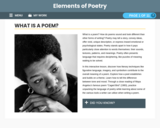
In this interactive lesson, discover how literary techniques like figurative language, imagery, and symbolism contribute to the overall meaning of a poem. Explore how a poet establishes and builds on a theme. Learn how to tell the difference between tone and mood. Through a close reading of Maya Angelou’s famous poem “Caged Bird” (1983), practice unpacking the language of poetry while learning about some of the various tools a writer can utilize when writing a poem.
This student-directed lesson can be completed online. Students will require a login if the instructor desires that they save their work to the platform. You will find detailed instructions on how to set up and manage accounts, class rosters, and assignments in the Help section of the interactive lesson plan.
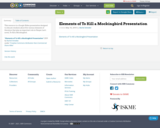
This resource is a Google Slides presentation designed to educate students about five various elements of literature that play an important role in Harper Lee's novel, To Kill a Mockingbird.

Published in English in 1960, Elie Wiesel’s Night is an autobiographical account of his experience in the Nazi concentration camps of Auschwitz and Buchenwald from 1944-1945.
(Digital Public Library of America (DPLA) Primary Source Sets are designed to help students develop critical thinking skills by exploring topics in history, literature, and culture through primary sources. Drawing online materials from libraries, archives, and museums across the United States, the sets use letters, photographs, posters, oral histories, video clips, sheet music, and more. Each set includes a topic overview, ten to fifteen primary sources, links to related resources, and a teaching guide.)
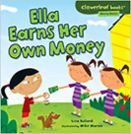
Within this collection you will find lessons, videos, handouts, and teacher guides you can use in your classroom. You will also find a brief summary of each resource with the source sited for further exploration, appropriate grade level, approximate lesson length, and learning standards.